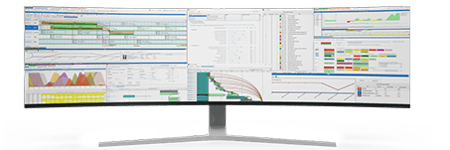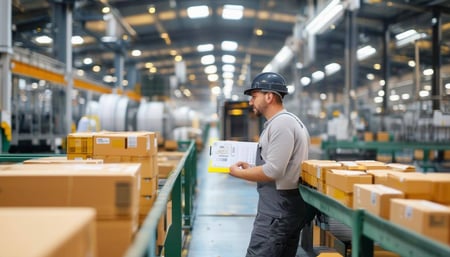Leveraging Sustainable Manufacturing Benchmarking Tools for Operational Excellence
Unlock operational excellence with sustainable manufacturing benchmarking tools. Integrate PlanetTogether with ERP, SCM, MES systems for impactful...
Discover key strategies for attracting and retaining top talent in packaging manufacturing, focusing on technology, training, and workforce optimization.
A strong, skilled workforce is critical to maintaining efficiency, quality, and competitive advantage in packaging manufacturing. As automation and digital transformation shape modern manufacturing, the role of the Supply Chain Manager becomes increasingly central—not just in ensuring materials flow smoothly through the production process, but also in attracting, retaining, and developing the talent necessary to make these processes run optimally.
In a highly competitive labor market, retaining a quality workforce is no easy task. For supply chain managers in the packaging sector, who are already grappling with operational complexities, addressing workforce challenges may seem daunting. However, with strategic focus on recruitment, employee development, and technology integration—including advanced planning tools like PlanetTogether and ERP systems such as SAP, Oracle, or Microsoft—organizations can enhance their ability to attract and retain top talent while driving operational success.
This blog will explore the multi-faceted challenge of workforce attraction and retention in the packaging manufacturing sector, offering actionable strategies for supply chain managers who want to optimize both their human capital and technological infrastructure.

The packaging industry is highly diverse, producing materials for sectors like food and beverage, pharmaceuticals, and consumer goods. Each of these sectors comes with its own set of regulations, technologies, and market demands. Consequently, the workforce required to meet these demands must be equally diverse in terms of skills and expertise.
However, workforce challenges in manufacturing are compounded by an aging labor pool, a growing skills gap, and increased competition for younger, more technologically adept employees. Supply chain managers in packaging are facing the dual task of ensuring seamless operational efficiency while developing strategies to attract and retain employees capable of handling the increasingly digital nature of manufacturing.
As automation, artificial intelligence (AI), and advanced manufacturing technologies such as the Internet of Things (IoT) become more integrated into the packaging process, the skills required on the factory floor are evolving. Manual labor jobs are giving way to roles that require proficiency in data analytics, process optimization, and familiarity with automated systems. This shift necessitates a change in both recruitment and retention strategies, particularly in ensuring that employees are continually upskilled to meet these new demands.
Moreover, supply chain managers must foster an environment where learning and adaptation to new technology is embraced, a culture that is attractive to both current and prospective employees.

In today’s competitive job market, prospective employees are not just looking for a paycheck—they’re looking for purpose, growth opportunities, and a positive work environment. An employer brand that communicates a clear commitment to employee development, work-life balance, and ethical practices can significantly enhance recruitment efforts.
For supply chain managers, this means aligning the organization’s values with the expectations of modern workers. Highlighting the company’s commitment to sustainability—whether in product innovation, production methods, or waste reduction—can resonate with younger talent, who are increasingly motivated by environmental and social responsibility.
Additionally, offering flexible work arrangements, such as remote work for office-based supply chain roles, or adopting shift patterns that accommodate employees’ personal lives, can make a company more attractive to a diverse talent pool.
Technology is not just transforming manufacturing processes—it’s also reshaping how companies attract talent. Supply chain managers in packaging manufacturing can use data-driven recruitment platforms and AI-powered tools to streamline the hiring process.
Platforms that integrate with systems like SAP, Oracle, and Microsoft can help managers track and assess candidate skills more effectively, ensuring that the right talent is identified more quickly. For example, using a recruitment management system (RMS) integrated with SAP allows supply chain managers to automate parts of the hiring process, improve the candidate experience, and optimize talent acquisition strategies based on real-time data.
Moreover, incorporating diversity and inclusion software into recruitment processes ensures that a wider talent pool is considered, addressing the need for new perspectives and innovation in the industry.
While compensation alone is not enough to retain top talent, offering competitive wages and benefits is still essential. Supply chain managers should work closely with human resources to ensure that compensation packages are benchmarked against industry standards and are appealing enough to attract top talent.
Additionally, offering benefits such as tuition reimbursement for advanced education, certifications in new technologies, or paid apprenticeships can make the company stand out as an employer of choice, especially for younger workers looking to grow their careers.

A well-trained workforce is a productive workforce. The integration of advanced planning and scheduling systems such as PlanetTogether with ERP platforms like SAP, Oracle, and Microsoft allows for greater operational transparency and more efficient use of resources, but these systems are only as effective as the people using them.
One of the most effective strategies for retaining employees is offering continuous learning and upskilling opportunities. Supply chain managers can implement training programs that help employees gain proficiency in using advanced manufacturing technologies, from automated equipment to software platforms that streamline production planning.
PlanetTogether, when integrated with ERP systems, enables better visibility into production schedules, resource allocation, and demand planning, making it easier for employees to understand the impact of their roles on overall operations. Offering training on these systems not only improves efficiency but also empowers employees, making them feel more invested in the company’s success.
For example, employees trained to use PlanetTogether alongside SAP can better manage production workflows, ensuring that resources are allocated efficiently while reducing bottlenecks. This not only improves operational outcomes but also provides workers with a sense of accomplishment and job satisfaction.
Employee engagement is a critical factor in retention. Supply chain managers can foster an engaged workforce by creating an environment where employees feel heard, valued, and empowered to contribute to process improvements.
Regular feedback loops, whether through formal performance reviews or informal check-ins, give employees a sense of ownership over their roles. Recognition programs that celebrate individual and team achievements can also boost morale and reinforce a culture of collaboration.
Implementing digital platforms that integrate with existing ERP systems can help facilitate employee feedback and recognition. For instance, integrating a performance management tool with Oracle or Microsoft can streamline feedback collection, set clear performance metrics, and provide transparency in career progression.
One of the top reasons employees leave a job is the lack of advancement opportunities. Supply chain managers can reduce turnover by creating clear pathways for career growth. This can be achieved by identifying key roles within the supply chain where employees can advance over time, whether through cross-training, leadership development programs, or by transitioning to more technical roles that leverage advanced technologies.
The packaging manufacturing sector is ripe for internal mobility, particularly as the industry adopts more complex technologies. Employees skilled in one area of the supply chain may be cross-trained to handle other responsibilities, ensuring flexibility and the opportunity for growth. In fact, promoting from within helps not only retain employees but also improves overall organizational knowledge and efficiency.
Work-life balance is increasingly important for employees across all industries, including manufacturing. Supply chain managers can support this by ensuring that shift patterns, workload distribution, and time-off policies are structured in ways that promote well-being.
Integrating employee scheduling tools with ERP platforms like Kinaxis or Aveva can help managers create optimized schedules that meet production goals without overburdening staff. By utilizing technology to predict demand and adjust scheduling accordingly, managers can reduce employee burnout and ensure that work-life balance is maintained.
![]()

Technology can be a key differentiator in both attracting and retaining a quality workforce. As packaging manufacturers continue to adopt Industry 4.0 technologies, the integration of advanced planning systems such as PlanetTogether with ERP platforms like SAP, Oracle, Microsoft, Kinaxis, or Aveva can dramatically improve operational efficiency—and help create a work environment that employees value.
For instance, integrating PlanetTogether with SAP or Oracle allows supply chain managers to better forecast labor needs, schedule production runs more efficiently, and optimize resource utilization. This reduces stress on workers by ensuring that they are neither underutilized nor overworked, and it enables more flexible, employee-friendly scheduling.
Moreover, these integrated systems enable real-time visibility into production workflows, helping employees understand how their roles fit into the larger operational context. This transparency can increase job satisfaction, as employees see the direct impact of their work on the company’s success.
When integrated with ERP systems like Microsoft Dynamics or Kinaxis, PlanetTogether also enables advanced analytics that can forecast demand fluctuations and workforce requirements. This ensures that labor shortages are minimized and that employees are allocated to the right tasks at the right times. By providing employees with tools to do their jobs more effectively, companies can foster an environment where workers feel more engaged and productive.
Additionally, managers can use these analytics tools to identify trends in employee performance, helping to tailor training programs that address specific skill gaps. This proactive approach to workforce development supports retention by ensuring that employees are constantly learning and growing within the company.
As packaging manufacturing continues to evolve with new technologies and market demands, it’s important for supply chain managers to stay ahead of future workforce challenges. The rapid growth of e-commerce, the increasing demand for sustainable packaging solutions, and the ongoing integration of smart manufacturing technologies are all contributing to an environment where flexibility and agility are essential.
A proactive workforce strategy should consider not only the skills needed today but also those that will be required in the future. By focusing on long-term workforce planning, supply chain managers can ensure that their teams are equipped to handle the next wave of industry changes.
The packaging industry, like all manufacturing sectors, is vulnerable to external disruptions such as supply chain shocks, economic downturns, and even public health crises like the COVID-19 pandemic. These disruptions underscore the importance of having a resilient and adaptable workforce capable of quickly responding to changing circumstances.
Supply chain managers can play a crucial role in building this resilience by fostering a culture of continuous improvement and flexibility. Cross-training employees to perform multiple functions within the supply chain, investing in leadership development programs, and embracing digital tools that improve decision-making are all strategies that can enhance workforce resilience.
Furthermore, integrating systems like PlanetTogether with ERP platforms such as Aveva or Kinaxis can help managers predict potential disruptions and adjust labor allocations accordingly. These systems enable better contingency planning, allowing supply chain managers to mitigate the impact of disruptions on both production and the workforce.
Finally, staying engaged with broader industry trends is essential for attracting and retaining top talent. The packaging industry is moving towards more sustainable practices, smarter manufacturing technologies, and increasingly complex supply chains. Supply chain managers who are attuned to these trends can position their companies as forward-thinking employers, attracting talent who are eager to work on cutting-edge projects.
For instance, the shift towards circular economies and sustainable packaging solutions offers opportunities to engage employees in meaningful work that aligns with their values. By promoting the company’s commitment to reducing its environmental impact, supply chain managers can attract employees who are passionate about sustainability and innovation.
In addition, as packaging manufacturers adopt more advanced technologies such as IoT, AI, and robotics, supply chain managers have the opportunity to attract tech-savvy employees who are excited about the future of manufacturing. Highlighting the company’s investments in digital transformation and advanced manufacturing technologies can help position it as an employer of choice for top talent in the industry.

Employer Branding: Develop a compelling employer brand that highlights sustainability, innovation, and employee development to attract top talent.
Technology Integration: Leverage advanced planning tools like PlanetTogether, integrated with ERP systems such as SAP, Oracle, Microsoft, Kinaxis, or Aveva, to optimize production planning and workforce management.
Continuous Training: Prioritize continuous learning and upskilling to ensure employees are proficient in new technologies and feel invested in the company’s success.
Employee Engagement: Foster a culture of engagement and recognition to improve retention and boost morale.
Career Development: Create clear pathways for career growth and internal mobility to keep employees motivated and reduce turnover.
Work-Life Balance: Use technology to optimize employee scheduling and ensure work-life balance, reducing burnout and increasing job satisfaction.
By focusing on these strategies, supply chain managers in packaging manufacturing can attract and retain a workforce that is skilled, engaged, and prepared to drive the future of the industry.
Attracting and retaining a quality workforce in the packaging manufacturing sector requires a multifaceted approach that blends technology, talent development, and a strong employer brand. Supply chain managers, who sit at the intersection of operational efficiency and human resource strategy, are uniquely positioned to lead this effort.
By leveraging advanced planning systems like PlanetTogether, integrated with ERP platforms such as SAP, Oracle, Microsoft, Kinaxis, or Aveva, supply chain managers can optimize not only production processes but also workforce management. These tools provide the data-driven insights needed to forecast labor needs, optimize scheduling, and create an environment where employees feel empowered and engaged.
In addition to technological integration, supply chain managers must prioritize continuous training, career growth, employee engagement, and work-life balance. These elements are key to creating a workforce that is not only capable of meeting today’s demands but also prepared to adapt to the future of packaging manufacturing.
Ultimately, companies that invest in their workforce—both in terms of technology and human capital—will be best positioned to succeed in a rapidly changing industry. By focusing on attracting and retaining a skilled, adaptable, and engaged workforce, supply chain managers can ensure that their organizations remain competitive and resilient in the years to come.
Are you ready to take your manufacturing operations to the next level? Contact us today to learn more about how PlanetTogether can help you achieve your goals and drive success in your industry.
Unlock operational excellence with sustainable manufacturing benchmarking tools. Integrate PlanetTogether with ERP, SCM, MES systems for impactful...
Learn how Purchasing Managers can drive sustainability in packaging manufacturing with PlanetTogether and ERP integration for smarter, greener...
Optimize your packaging supply chain with PlanetTogether & ERP integration for real-time visibility, efficiency, and sustainability.
Be the first to know about new B2B SaaS Marketing insights to build or refine your marketing function with the tools and knowledge of today’s industry.